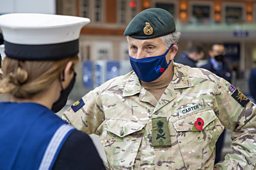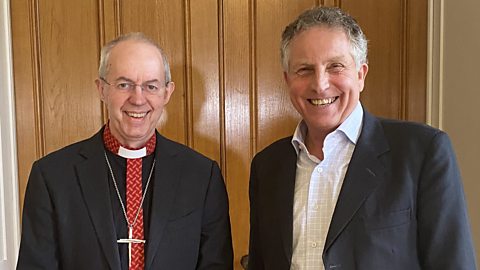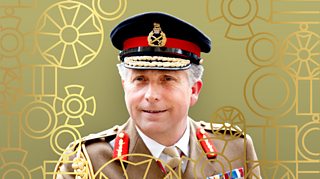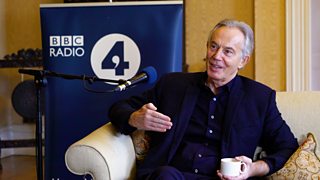10 things we learned when the Archbishop of Canterbury met General Sir Nick Carter

In the latest episode of Radio 4's The Archbishop Interviews, the Archbishop of Canterbury, Justin Welby, talks to General Sir Nick Carter, who, before retiring as head of the British Armed Forces, commanded forces in Kosovo, Iraq and twice in Afghanistan.
Among the various topics they discuss is what it takes to be a moral authority on the battlefield in the face of a disinformation war and increasing polarisation in politics. With conflict ongoing in Ukraine, their discussion could not be more relevant.
1. Leaders should be values-based
The Archbishop points out that a lot of senior officers in the Wehrmacht (Nazi Germany’s armed forces) were practising Christians, noting “one swims in the culture, they were clearly contaminated by the culture.”
General Sir Nick believes that “leaders must care for who they lead” and be “values-based”. The moral high ground, he suggests, is crucial. “The reality is if you want to retain the moral high ground which you should do on the battlefield, then you do need to adhere to the rules of war.”
2. Ethics and the information war
The ethical dimension of military conduct plays out on paper more easily than it does in practice, of course. Tackling the issue of war in Ukraine head on, Sir Nick recognises that “there are probably a lot of Russian leaders at the moment who are wondering what they have unleashed.”
Part of the problem of retaining military integrity is what information is being received, a particular issue for modern warfare, believes Sir Nick. “I wonder how many of them [Russian leaders] actually know what is going on around them and the way in which that war is being managed? I would like to think that people are beginning to wonder whether what they're doing is morally right.”
3. "Courageous restraint" and winning trust
Talking about his time in Afghanistan, General Sir Nick believes that an arbitrary use of violence will inevitably lose the support of the people you are protecting. He concedes that the multinational force that was present in Afghanistan did cause collateral damage in its pursuit of terrorist leaders; however, he says the overall policy was one of "courageous restraint". One example of this policy was the aviation assault on Marjah in the Helmand province – “the largest in Afghan history and probably since Vietnam”, Sir Nick says. The operation was conducted without recourse to artillery systems or to air power, in order to protect the local population

4. The moral component of war
Both the Archbishop and General Sir Nick share an interest in Field Marshal William Slim and his book "Defeat Into Victory" about the retaking of Burma by Allied forces during the Second World War. In the book, Slim explains that morale is built on spiritual, intellectual and material values.
The challenge that we've all had in the campaigns for the last 20 years is that they are wars of choice.Sir Nick Carter
General Sir Nick believes that Slim’s assessment is an immortal one. “Fighting power is about a component that is conceptual, one that is obviously physical, but importantly, one that is moral.”
“That moral component is very obvious on one side of what is happening in Ukraine and very obviously absent on the other side. And that makes a big difference to who prevails on battlefields.”
5. Wars of necessity and wars of choice
The Archbishop recalls meeting one of Canterbury Cathedral’s security guards who had done two military tours of Afghanistan and of Iraq. Speaking of the fall of Kabul, the man asked, "Why did my closest friend die in my arms? What did he die for?"
General Sir Nick recognises that “it is probably easier to find a compelling reason to fight if your state is facing an existential threat” and that “the challenge that we've all had in the campaigns for the last 20 years is that they are wars of choice, and trying to find the overwhelming rationale for why you fight in those campaigns is very difficult.”
Notwithstanding this, General Sir Nick correctly identifies that the man who spoke to the Archbishop said that he wouldn't have swapped the experience for anything else.
“I think a fascinating facet of military life is that war, for weird reasons, is glamorous,” says Sir Nick. “It's what you trained to do. So, if you get a chance to go and conduct combat operations, most people will absolutely insist on going to do it.”
6. The fight continues after the battle
The psychological effect of fighting a war is enduring. With the war in Ukraine, this is now going to be the case for civilians, many of whom – including a friend of the Archbishop’s – have hastily retrained from professions that are worlds away from the military.
A patron of a veteran’s charity that helps with PTSD, among other disorders, General Sir Nick feels that both soldiers and civilians in this current conflict will find it hard to put the experience behind them.
“I think we should expect the population of Ukraine, whether they're professional soldiers or whether they are civilians, to be suffering significantly for years after this. That, of course, is going to be very challenging when you come to reconciliation because reconciliation is fundamentally the way that wars end and the way that we assure peace.”

How would you behave if you were a senior Russian officer?
Justin Welby probes Sir Nick Carter on battlefield morality.
7. Non-destructive ways of disagreement
Drawing on two decades of experience helping to mediate armed conflicts across the globe, the Archbishop says that reconciliation is “not about agreement”, rather it is “to find non-destructive ways of disagreement”, in other words “forms of disagreement in which you can disagree absolutely passionately but you don't want to destroy the other person.”
Reconciliation is 'not about agreement', rather it is 'to find non-destructive ways of disagreement'...Justin Welby
Creating the conditions for meaningful conversations was a key part of General Sir Nick’s role in Afghanistan, with the end goal being “political stability” and the population “feeling reassured and connected to some form of effective governance that wasn't corrupt and self-serving, and inculcating of insurgency.”
Inevitably, this was not easy and other commanders believed the mission to be more about killing terrorists. “That may be a facet of what you have to do,” says Sir Nick, “but that's not the way to achieve a lasting settlement and lasting effect.”
8. Politics is upping the stakes
There’s another factor to achieving compromise in conflict – the political climate. “While the character of warfare is evolving, the character of politics has evolved as well,” says Sir Nick. “We're ending up with politics which is very populist and often very nationalist. And of course, you end up with stark poles. Reconciliation is about identifying the middle ground and it's how you find that compromise that is so fundamental.”
9. Faith has sustained Sir Nick in times of trouble
Though Sir Nick admits he is “not a massively regular churchgoer”, he says that faith has sustained him at low points in his career, including in Afghanistan.
“Almost every night, or certainly every other night, we would be parading on the pan at Kandahar airport at two or three o'clock in the morning to send more dead bodies back to the United States or elsewhere. And you never stood in one of those ceremonies without thinking about whether your plan a bad plan.
"You know, there were times when you really did depend upon your faith and your sense of purpose. It's something that's always been there for me, even if it may not have been very obvious to those around me. So, it has been a sustaining and reassuring presence.”
10. Emerging from an emotional desert
While faith has sustained Sir Nick in battle, family was more difficult to draw comfort from.
“You need to become an emotional desert to your family and to your loved ones because your emphasis needs to be on your soldiers and those that you're leading,” Sir Nick says, adding: “that means when you do come home, it's really, really difficult to dial those emotions back up.”
“I have remained, as many of my soldiers have, in the valley of the shadow of death,” admits Sir Nick. His wife and his friends have helped him negotiate this emotional terrain, but Sir Nick admits that he has had to push himself to open up. “You've got to take time out to do it, and I've got a bit more time on my hands now and one’s working through this to be a better husband, a better father and a better friend.”
-
![]()
The Archbishop interviews Nick Carter
Justin Welby's guest is the recently retired head of the British Armed Forces, General Sir Nick Carter. He joined the army as an 18-year-old, serving in Northern Ireland, Kosovo, Iraq and twice in Afghanistan. He has seen conflict at its most intense, complex and intractable. He knows what it is like to make decisions that save and cost lives.

More deep conversations on Radio 4
-
![]()
General Sir Nick Carter鈥檚 Today Programme
Highlights from General Sir Nick Carter鈥檚 guest edit.
-
![]()
The Archbishop Interviews... Elif Shafak
Justin Welby and the novelist Elif Shafak discuss forgiveness, depression and the wisdom of grandmothers.
-
![]()
The Archbishop interviews... Dr Susan Blackmore
Coming from very different perspectives, Justin and psychologist Susan Blackmore find some common ground on consciousness.
-
![]()
The Archbishop interviews Tony Blair
The former PM reveals that the values and principles of his faith underpinned his career.





